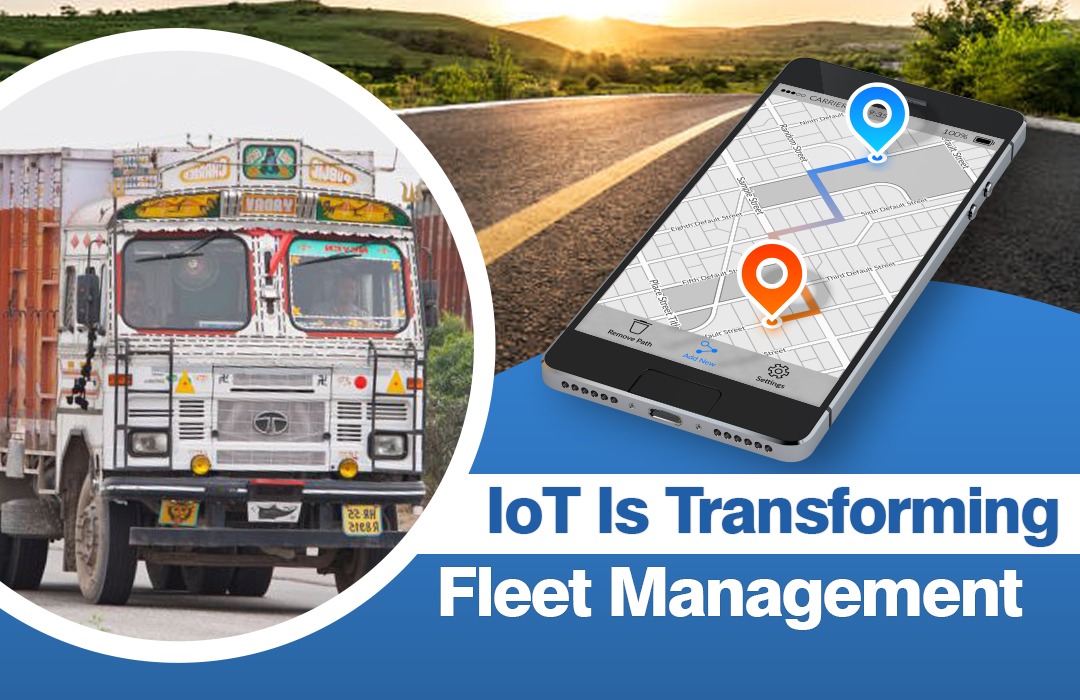
Tracking SolutionWritten By: Suman Kumar Paul
The IoT is among the fastest-growing technology revolutions offering the world all the advantages of an interconnected architecture. Most businesses are proactively using the possibilities of IoT solutions.
Digital-age advancements have triggered an extraordinary revolution in the fleet management business. Intelligent technologies, sensors, controllers, and other IoT-enabled devices are showing to be expansion and productivity facilitators for fleet managers. According to studies, the global revenue for IoT fleet management is predicted to reach $15,500 million by the end of 2024, up from $3,250 million in 2016. According to research companies, the future possibilities for IoT appear to be promising, and worldwide fleet managers are widely integrating the technology.
IoT Revolutionizing Fleet Management Systems
The Internet of Things (IoT) technology has expanded fleet management potential to the point where we cannot afford to be wrong if we call it the curator of the other systems that support intelligent fleet management systems. The concept of interconnected automobiles has become a reality due to the Internet of Things. The technology has eased Machine-to-Machine (M2M) connectivity and integrated communications with analytics to collect and distribute important data to stakeholders in real-time, which is the primary factor for all the benefits intelligent fleet management systems have to offer.
The following are seven approaches that IoT can aid the fleet management industries to transform and acquire an edge over their competitors.
Task and process automation
At its best, automation aids in the establishment of smart transportation channels and the protection of resources such as drivers and vehicles. According to statistics, 90% of fatalities are caused by human faults, and automating is noticed to be an ideal approach for risk mitigation. Automation, on the other hand, enables smart vehicles to send notifications to surrounding maintenance facilities and fleet managers in the case of a breakdown or accident.
Remote Equipment Supervision and Vehicle Tracking
Smart fleet management systems incorporate the maximum use of telematics, a vehicle-specific IoT application. It enables fleet managers to conveniently monitor the location and movements of vehicles as well as assets by integrating sensors and GPS devices into them. Telematics is meant to capture and send data in real-time and facilitates two-way communication. As a result, it notably assists fleet operators in monitoring the safety of both vehicles and drivers, as well as ensuring scheduled delivery of the goods.
Effective Fleet Operations Management
IoT enables an interconnected environment where data flows seamlessly by combining with different technologies including cloud, big data, and others. Fleet managers can also combine intelligent fleet management technologies with their current ERP systems, allowing management and monitoring centers to generate highly accurate decisions more efficiently.
Cost reduction and increased profitability
The Internet of Things (IoT) assists freight and transportation enterprises in eliminating conventional modes of operation, which are not only time-consuming and expensive but also create miscommunications between stakeholders. Technology effectively combines with different technologies to improve fleet operations daily.
Evaluating Engine Performance and Fuel Efficiency
Standard fleet management approaches have never been incredibly valuable to fleet operators in evaluating vehicle engine performance and fuel economy. However, this is not the case with smart vehicles. The system improves fleet operators' decision-making abilities while also improving vehicle longevity.
Effective Driver Behavior Management
The performance of the fleet in businesses is highly dependent on how their drivers perform. Businesses can utilize IoT to monitor breaches simply & virtually, as well as whether drivers are adhering to operational regulations & obeying the planned timetables and routes. IoT employs sensors that allow fleet managers to examine the timing of engine ON/OFF, braking, acceleration, and sometimes even sleep patterns.
Big Data Insights Improves Decision Making
IoT-enabled intelligent fleet management systems are worth considering as they help businesses to generate commercial value through strong data and statistics analysis. Once data is analyzed, fleet managers discover actionable data for better fleet operations and management.
IoT Contributes to More Than Just Intelligent Fleet Management
IoT is the cradle in which an interconnected ecosystem grows. The ecosystem integrates corporate apps and resources, regardless of geographic location, to assist fleet managers in gathering meaningful data. IoT technologies, for example, serve as a facilitator, bridging the communication gap between suppliers and consumers and strengthening their partnership.
Another angle to consider is the environmental advantage. According to studies, the IoT-based interconnected ecosystem assists fleet operators in reducing vehicle-to-site delay by around 68%. It eventually leads to lower fuel consumption, which contributes to lower emissions and lower carbon footprints.
Want to learn more about how IoT can assist fleet management systems in reducing expenses and improving productivity? Call our experts to learn how smart vehicles are assisting fleet management in meeting regulations, increasing driver performance, lowering expenses, and more.
TAGS - Best GPS Fleet Tracking Software Advanced GPS Fleet Tracking Software mining fleet fleet operations fleet maintenance best fleet management system india best fleet management system kolkata